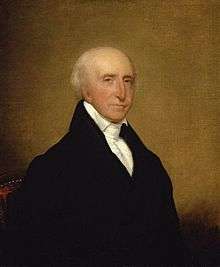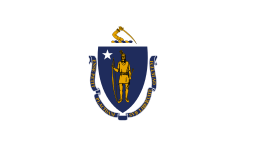Benjamin Pickman Jr.
| Benjamin Pickman Jr. | |
|---|---|
 | |
| Member of the U.S. House of Representatives from Massachusetts's 2nd district | |
|
In office March 4, 1809 – March 3, 1811 | |
| Preceded by | Joseph Story |
| Succeeded by | William Reed |
| Member of the Massachusetts House of Representatives | |
|
In office 1797-1802 1812-1813 | |
| Member of the Massachusetts Senate | |
|
In office 1803 | |
| Personal details | |
| Born |
September 30, 1763 Salem, Massachusetts |
| Died | August 16, 1843 (aged 79) |
| Political party | Federalist |
| Spouse(s) | Anstiss Derby |
| Children | Hasket Derby Pickman, Benjamin T. Pickman[1] |
Benjamin Pickman Jr. (September 30, 1763 – August 16, 1843) was a U.S. Representative from Massachusetts.
Biography
Pickman was born in Salem, Massachusetts, a descendant of Benjamin Pickman, an Englishman from Bristol.[2][3] Pickman graduated from Harvard University in 1784 after having attended Dummer Academy (now known as The Governor's Academy). The descendant of a Salem merchant family dynasty related to other prominent Salem families such as the Derbys, the Pickerings and the Crowninshields,[4] Pickman studied law in Newburyport, Massachusetts, and was admitted to the bar, but soon relinquished the practice of law to engage in commercial pursuits, becoming one of the most active merchants of his day in Salem.

Pickman's father Col. Benjamin Pickman, Sr.,[5] one of the most important merchants in Salem, had been a Loyalist, his estates confiscated by the Colonial government and was forced to flee America for England, only returning to Salem in 1785 after the end of the Revolutionary War.[6]
Benjamin Pickman Jr., served the new nation in several capacities. He was a member of the Massachusetts House of Representatives in 1797-1802, 1812, and 1813. Benjamin Pickman Jr. also served in the Massachusetts Senate in 1803, as well as a member of the executive council of the State in 1805, 1808, 1813, 1814, and 1819-1821.
Pickman was elected as a Federalist to the Eleventh Congress (March 4, 1809 – March 3, 1811), but he was not a candidate for renomination in 1810. He served as member of the convention to revise the constitution of the State of Massachusetts in 1820. He served as overseer of Harvard University 1810-1818. He served as president of the board of directors of the Theological School at Cambridge. He died in Salem, Massachusetts, August 16, 1843, and was interred with his Pickman ancestors in Salem's Broad Street Cemetery.[7] He was elected a Fellow of the American Academy of Arts and Sciences in 1815.[8]
Pickman was instrumental in the commercial development of much of the heart of historic Salem. In 1815 he and John Derby III acquired property belonging to Derby family heirs to develop Derby Square, which would encompass three brick commercial rows. The Pickman-Derby Block, built in 1817, still stands. The Pickman Building on Derby Square, built in 1816, was part of the development.[9] All of these buildings would be connected to a series of smuggling tunnels leading to the wharfs in town[10] The Pickman family also owned Pickman farm. Salem's Pickman Street is named for them.[11]
Benjamin Pickman Jr. was married to Anstiss Derby, daughter of Elias Hasket Derby and Elizabeth Crowninshield.[12] The son of Benjamin Pickman and the former Anstiss Derby was Hasket Derby Pickman, who died in 1815, the same year he graduated from Harvard College.[13]
References
- ↑ Roberts, Oliver Ayer (1897), History of the Military company of the Massachusetts, now called The Ancient and Honorable Company of Massachusetts. Volume II. 1738-1828., Boston, MA: The Ancient and Honorable Company of Massachusetts., p. 408.
- ↑ The Founders of the Massachusetts Bay Colony, Sarah Sprague Saunders Smith, Sun Printing Company, Pittsfield, Mass., 1897
- ↑ Naturalization papers of Benjamin Pickman, Dudley Leavitt Pickman Papers, Phillips Library Collection, Peabody Essex Museum, pem.org Archived December 18, 2014, at the Wayback Machine.
- ↑ Pickman House, Essex Institute Historical Collections, Essex Institute, Peabody Essex Museum, Vol. XXXIX, Printed for the Society, Salem, 1903
- ↑ The Founders of the Massachusetts Bay Colony, Sarah Sprague Saunders Smith, Sun Printing Company, Pittsfield, Mass., 1897
- ↑ The Journal and Letters of Samuel Curwen, An American in England, Samuel Curwen, George Atkinson Ward, Little, Brown and Company, Boston, 1864
- ↑ Pickman family tomb, Broad Street Cemetery, Salem, Massachusetts, smugmug.com Archived August 4, 2009, at the Wayback Machine.
- ↑ "Book of Members, 1780–2010: Chapter P" (PDF). American Academy of Arts and Sciences. Retrieved August 7, 2014.
- ↑ Architecture in Salem, Bryant Franklin Tolles, Jr., Bryant F. Tolles, Carolyn K. Tolles, Paul F. Norton, reprinted by UPNE, 2004
- ↑ , Salem Secret Underground: The History of the Tunnels in the City, Christopher Jon Luke Dowgin, Salem House Press, 2011
- ↑ The Pickman Silver, Essex Institute Historical Collections, Essex Institute, Peabody Essex Museum, Vol. XXXIX, Salem, Mass., 1903
- ↑ Life in a New England Town, 1787, 1788, John Quincy Adams, Charles Francis Adams, Little, Brown and Company, Boston, 1903
- ↑ Gravestone of Hasket Derby Pickman, Old Burying Point, Salem, Massachusetts, gravematter.smugmug.com
External links
- United States Congress. "Benjamin Pickman Jr. (id: P000330)". Biographical Directory of the United States Congress.
- Grave of Benjamin Pickman Jr., Broad Street Cemetery, Salem, Massachusetts, Find-A-Grave
See also
![]() This article incorporates public domain material from the Biographical Directory of the United States Congress website http://bioguide.congress.gov.
This article incorporates public domain material from the Biographical Directory of the United States Congress website http://bioguide.congress.gov.
| United States House of Representatives | ||
|---|---|---|
| Preceded by Joseph Story |
Member of the U.S. House of Representatives from Massachusetts's 2nd congressional district March 4, 1809 – March 3, 1811 |
Succeeded by William Reed |

